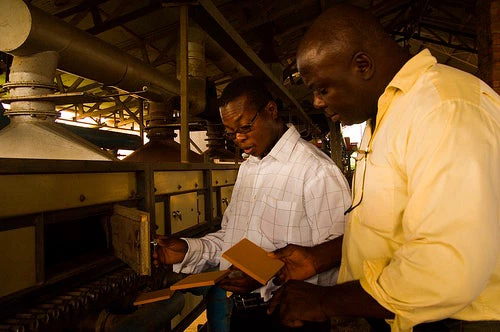Growth poles can help create jobs for Africa's one billion citizens (Credit: World Bank)
We were asked the other day by our senior management to be outrageously aspirational when we engage with growth poles. I have been reflecting on what this means for our work on this topic in Africa, especially in light of the findings of the Africa Competitiveness Report. I think we need to be aspirational in three broad directions: (i) developing the capacity to get things done in Africa, (ii) ensuring all stakeholders benefit from growth, and (iii) mobilizing as much capital as we can, whether it be private, philanthropic or public.
So how do we get things done and develop functioning, job-creating growth poles? I think this is the biggest challenge. Developing a growth pole requires a complex mix of multi-disciplinary skills, the ability to encourage and sometimes coerce not necessarily willing public sector actors, the ability to engage in a credible sometimes entrepreneurial way with the private sector and to constantly think outside the box. Is this the Africa we know? It’s certainly the Africa the continent aspires to be.
In terms of getting things done innovative delivery systems are key – these could be public private partnerships, collaborations with NGO’s, autonomous development agencies or interesting combinations of national and regional public sector actors.
There is also a need to involve and include all stakeholders particularly those local communities that may feel like their land is grabbed, or they are missing out on the wealth that obviously surrounds them. They often don’t see any meaningful change in their lives from economic initiatives, and this is something that needs to change. Building on our delivery platforms, the solution will involve a strong interactive public private dialogue.
Resources are required to make things happen, and for this we should be willing to draw on private, philantrophic and public sources. In our work in Sierra Leone we see interest from philanthropic organizations to engage in the growth pole on strengthening cocoa value chains. We see private sector actors wanting to make investments in their own right and to work with the Government in public private partnerships to build critical infrastructure. We see the local private sector and small farmers wanting to work with large foreign investors and we see donors and the Government keen to support delivery systems, catalyze action and build key pieces of public infrastructure.
So is this different, is this outrageous? In a way it is pushing us away from just thinking about investments per se to a holistic, dynamic approach. It is an approach that resonates with our partners in the African countries because it is transaction oriented whether it is public sector investment or a private sector deal. It is also a fast real time engagement where it’s not about the paper work but getting results. On a personal note, it’s fun and different and takes me back to my private sector roots.



Join the Conversation